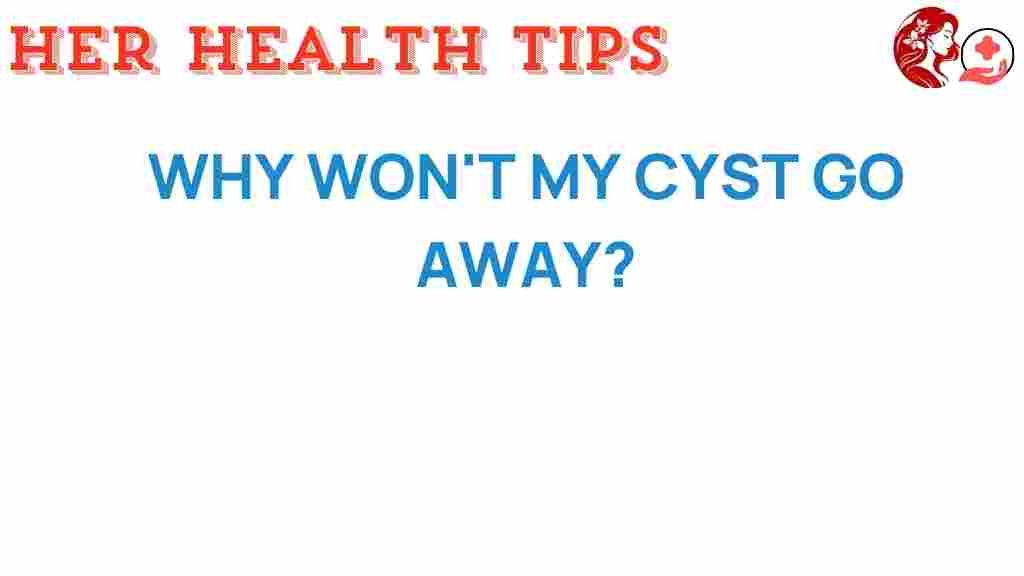Unraveling the Mystery: Why Won’t My Cyst Disappear?
Cysts are fluid-filled sacs that can develop in various parts of the body, and while many are harmless, they can cause discomfort and concern. If you’ve found yourself wondering, “Why won’t my cyst disappear?” you’re not alone. This article will delve into the reasons behind persistent cysts, including their symptoms, diagnosis, treatment options, and prevention methods. We aim to provide you with a comprehensive understanding of cysts to empower you in managing your health.
Understanding Cysts
A cyst is a closed pocket of tissue that can be filled with air, fluid, or other materials. They can occur anywhere in the body, including the skin, organs, and bones. Cysts can vary in size and may be asymptomatic, but they can also lead to discomfort or pain depending on their location and growth.
Common Symptoms of Cysts
While many cysts are benign and cause no symptoms, others can lead to noticeable signs. Here are some common symptoms associated with cysts:
- Swelling: A raised bump on the skin or under the skin.
- Pain or Discomfort: Tenderness or pain in the area of the cyst.
- Redness or Inflammation: Surrounding skin may appear red or swollen.
- Drainage: Some cysts may leak fluid or pus.
Diagnosis: How Are Cysts Identified?
If you have a cyst that won’t disappear, it’s important to seek medical advice for an accurate diagnosis. The following methods are commonly used:
- Physical Examination: A healthcare provider will assess the cyst’s size, shape, and texture.
- Imaging Tests: Ultrasounds, CT scans, or MRIs may be used to visualize the cyst and surrounding structures.
- Biopsy: In some cases, a sample of tissue may be taken for laboratory analysis to rule out cancer or other conditions.
Understanding the diagnosis can help in determining the appropriate treatment and management strategies.
Why Some Cysts Don’t Disappear
There are several reasons why a cyst may persist despite attempts at treatment:
- Type of Cyst: Certain types of cysts, like epidermoid cysts or pilar cysts, are more likely to remain unless surgically removed.
- Location: Cysts located in areas with high friction or pressure may not heal as easily.
- Infection: An infected cyst may become inflamed and persist until the infection is treated.
- Improper Treatment: Attempting to drain or pop a cyst without proper medical guidance can lead to complications and recurrence.
Treatment Options for Cysts
The treatment for a cyst largely depends on its type, location, and whether it causes symptoms. Here are some common treatment options:
1. Watchful Waiting
If the cyst is small and asymptomatic, your doctor may recommend simply monitoring it over time. Many cysts will resolve on their own.
2. Medication
In cases where a cyst is infected or causing discomfort, your doctor may prescribe:
- Antibiotics: To treat any infection associated with the cyst.
- Corticosteroid Injections: To reduce inflammation and discomfort.
3. Surgical Removal
If a cyst is persistent, painful, or causing issues, surgical removal may be necessary. This procedure involves:
- Excision: The cyst is removed entirely, which reduces the chance of recurrence.
- Drainage: For larger cysts, drainage may be performed, although this does not prevent recurrence.
4. Home Remedies
While home remedies cannot cure cysts, they may help alleviate discomfort:
- Warm Compresses: Applying a warm compress can help reduce inflammation and promote drainage.
- Over-the-Counter Pain Relief: Non-steroidal anti-inflammatory drugs (NSAIDs) can help manage pain.
Troubleshooting Persistent Cysts
If you find that your cyst won’t disappear despite treatment, consider the following troubleshooting tips:
- Consult a Specialist: If your primary care physician cannot provide answers, consider seeing a dermatologist or surgeon who specializes in cysts.
- Keep a Symptom Diary: Track any changes in size, pain level, and associated symptoms. This information can be valuable for your healthcare provider.
- Avoid Self-Diagnosis: Avoid trying to diagnose or treat the cyst on your own; always seek professional help.
Prevention: Can Cysts Be Prevented?
While not all cysts are preventable, there are some strategies you can employ to reduce your risk:
- Maintain Healthy Skin: Regularly cleanse and moisturize your skin to prevent clogged pores.
- Manage Underlying Conditions: Conditions such as acne can predispose you to cyst formation; proper treatment can help.
- Avoid Irritation: Minimize friction in areas prone to cysts, such as the scalp or underarms.
When to Seek Medical Attention
It’s important to seek medical attention if you experience:
- Increased pain or discomfort.
- Signs of infection, such as fever or pus.
- Rapid growth of the cyst.
- Changes in the appearance of the cyst.
Conclusion
Cysts can be a source of confusion and concern, especially when they won’t disappear. Understanding the nature of your cyst, its diagnosis, and treatment options is essential to managing your health effectively. If you are experiencing discomfort or have persistent cysts, don’t hesitate to consult a healthcare professional for tailored advice.
For more information on cysts and their treatment options, you might find this resource helpful. Additionally, if you are looking for support and community, consider visiting this external link for more insights on managing cysts and health-related discussions.
Your health is paramount, and being informed is the first step toward effective management.
This article is in the category Conditions and created by HerHealthTips Team
